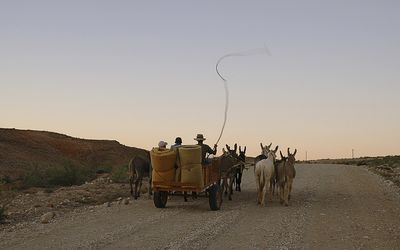PBS: Escaping Eritrea … [Read More...] about ካብ ውሽጢ ቤት ማእሰርታት ኤርትራ
Failure to address first land-grab undermines BEE
BY PHAKAMISA NDZAMELA, 11 AUGUSTI 2015, BUSINESS DAY (SOUTH AFRICA)
THERE are many papers and books on black economic empowerment (BEE), but one has yet to hear of a major deal that has benefited the first people to be dispossessed in SA, the Khoi and San.

The failure to address the genesis of colonial theft in this country undermines the BEE project. What it means is that BEE has not taken into consideration the deep economic history of SA and those who fought and lost the battle against the colonialists. The omission also raises questions about the history curriculum. Have students been taught the accurate history that will enable the country to learn and correct the mistakes of the past? I doubt it.
The year 1510 in SA is critical but remains largely unknown. About 505 years ago in one of the first recorded battles against Europeans in the Cape, the Khoi people were involved in a major confrontation with a Portuguese group led by viceroy, explorer and soldier Francisco de Almeida. The Portuguese were dealt with severely after trying to steal the wealth, women and children of the Khoi. De Almeida lost his life in that failed dispossession.
We learn from the research of journalist John Cope in his book titled King of the Hottentots that a century later, in about 1614, a leader of the Xhorana part of the Khoi, chief Xhore and his people, deterred the English East India Company led by Thomas Smythe from settling English convicts in the Cape. Xhore had been kidnapped in about 1613 by the English. He was taken on a ship to England and settled at Thomas Smythe’s house, where he was given an experience of living an English elite life.
The aim was to teach Xhore English so that he would be able to communicate better with the settlers. However, Xhore was not excited about this treat and in fact made a plea to be taken back home. Apparently, Xhore learnt more about the English in London than they did about him. When he was brought back to the Cape, Xhore alerted his people about the true value of iron, copper and brass.
This led to hardened attitudes as the Khoi were not prepared to exchange their cattle cheaply for scraps of metal. Cited in Cope’s work is John Milward, a merchant on board a ship known as The Thomas. Milward is quoted as having said: “They demanded unreasonably for their cattle, which we thought proceeded from Xhore who had been in England and, as we supposed, acquainted them with our esteem of iron and copper.”
Xhore and his people, having grown suspicious of the English East India Company, started refusing to supply the ships with cattle. Battles broke out. This contributed to the English East India Company’s failure to start a settlement at the Cape.
But the Khoi and the San were to suffer dispossession after the arrival of the Dutch East India Company, which started building a settlement in 1652. The arrival of the Dutch led to a number of Dutch-Khoi wars as the Khoi fought to defend their wealth and vast ancestral land.
In the late 1650s, Khoi leader Autshumato was imprisoned on Robben Island, but managed to escape. Despite their resilience, the Khoi and the San ultimately lost the wars and were the first people to be dispossessed in this country.
I spoke to Zenzile Khoisan, the custodial chief of the Gorinhaiqua Cultural Council to verify if my question about BEE was correct. The only deal I had read about was in the tourism industry and involved Khoisan X Investments 10 years ago.
Zenzile Khoisan told me: “When democracy was launched, some things had to give and (one) of the trades made between the liberation movements and the apartheid regime was that certain issues were not going to be addressed. One was the dispossession, the genocide, the social, economic and psychological trauma to which the first people have been subjected, resulting in their excision.”
He spoke of 14 edicts and pieces of legislation that were used to dispossess the Khoi and San people. Many coloured people had an ancestral link to the Khoi and San. However, they have not been recognised, and their stolen land has not been returned.
Can we call BEE a success without addressing the first to be dispossessed? I doubt it.
Ndzamela is finance writer
